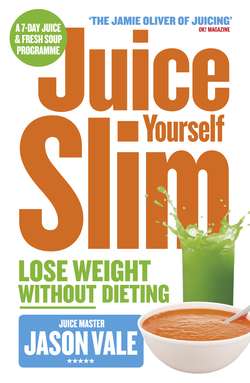Читать книгу The Juice Master Juice Yourself Slim: The Healthy Way To Lose Weight Without Dieting - Jason Vale, Jason Vale - Страница 24
Оглавление3
The Appliance of Juicy Science
When you apply a touch of what is deemed ‘scientific evidence’ to the health effectiveness of juices and smoothies, more people seem to take notice. And while I believe the best and most reliable ‘evidence’ for the healing power of fruits and vegetable juices is the hundreds of thousands of real stories which have been recorded over the centuries, I am also incredibly open to any genuine scientific study on this subject. Some of the following juice-based scientific evidence is so overwhelming that even the most ‘juice sceptic’ person out there may well be persuaded to join the juice therapy revolution.
As this isn’t a ‘juice study’ book, I am providing just a few examples of the therapeutic power of fruit and vegetable juices. My hope is that when you see just how effective juices can be when it comes to some quite serious ailments, you will realize just how powerful they will be on what is now the most common disease of all – FAT!
Grape Juice Study Debunks Wine’s Health Claims
A study conducted by Dr John D Folts, professor of medicine and director of the Coronary Artery Thrombosis Research and Prevention Laboratory at the University of Wisconsin Medical School, found that purple grape juice is about 66 per cent more effective at treating heart disease than alcohol, but without the harm caused by ethyl alcohol.
Purple grape juice is more effective at treating heart disease than alcohol.
Dr Folts began his studies with a variety of animal species before moving on to human volunteers. Each person in the study had their platelet activity measured half an hour before and after drinking 20–24 ounces (roughly three glasses) of juice. In the studies, purple grape juice in particular reduced platelet activity by more than 40 per cent. This percentage makes it as effective as aspirin therapy for people who are at risk of heart disease. Unlike aspirin, however, grapes have zero adverse side-effects! Also, the flavonoids in purple grape juice remained effective when adrenaline levels in the blood were increased, unlike aspirin. This suggests grape juice may well be more effective than aspirin therapy for people with heart disease. Folts admits more study is required and explains that if someone is taking aspirin therapy they shouldn’t just stop and go on grape juice, but he agrees the results look promising.
For years we were told that red wine helps with heart disease. When I wrote The Easy Way to Stop Drinking back in 1998, I explained that in no way, shape or form was any positive health effect of wine due to the alcohol. Alcohol is a poison. It is a drug directly and indirectly responsible for over 50,000 deaths in the UK alone, yet at the same time the ‘experts’ tell us we should have small amounts as it’s good for our heart. Why on earth don’t they explain that it’s not the red wine but the flipping grapes that make the wine? It’s the grapes that have the flavonoids, and given grape juice is 66 per cent more effective than the fermented version known as ‘wine’, doesn’t it make sense to juice some fresh grapes if you are concerned about your health rather than knocking back a bottle a wine?
Drinking wine in order to get the antioxidant benefits of grapes is the same as eating Jaffa Cakes to get some vitamin C from the orange flavour inside, or eating a Snickers bar for your daily intake of nuts! For years people said they were drinking Guinness as it was high in iron. However – and this is just a wild stab in the dark – the chances of people actually drinking Guinness simply because they were genuinely worried about their iron count is about as likely as Tom Cruise winning a ‘Tallest man in the world’ contest. It also seems odd that the people who advocate wine to be ‘good for the heart’, particularly for men over 40, tend to be male doctors, usually over the age of 40 – umm, funny that.
Apple Juice May Prevent Asthma
The old saying is, ‘an apple a day keeps the doctor away’, and it appears we can now add ‘an apple juice a day keeps the doctor away’. Studies have shown that apple juice has many positive health benefits. For example, it has a powerful effect on memory, and can help prevent an often serious condition which is becoming more common by the day – asthma.
Apple juice has a powerful effect on memory and can help prevent asthma.
The National Heart and Lung Institute research, published in the European Respiratory Journal, found that children who drank apple juice at least once a day were half as likely to suffer from wheezing as those drinking it less than once a month. Interestingly, the study also concluded that eating fresh apples themselves gave no apparent benefits, illustrating that at times the juice contained within can have even greater health properties than the whole fruit.
There is some evidence that a healthy diet rich in antioxidants and vitamins is good for asthma.
— Dr Mike Thomas, Aberdeen University
Dr Peter Burney, who led the project, said it was possible that ‘phyto-chemicals’ in apples, such as flavonoids and phenolic acids, were helping to calm the inflammation in the airways, which is a key feature of both wheezing and asthma.
